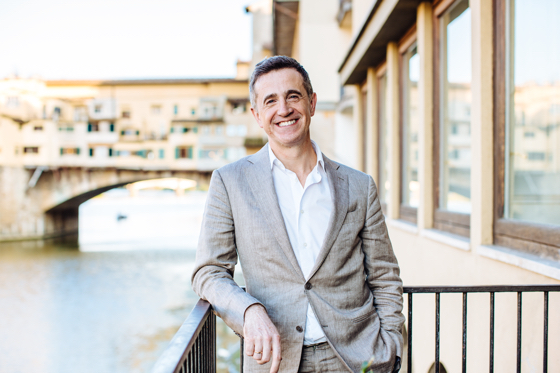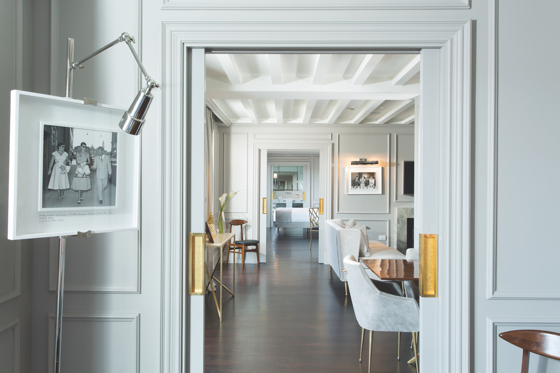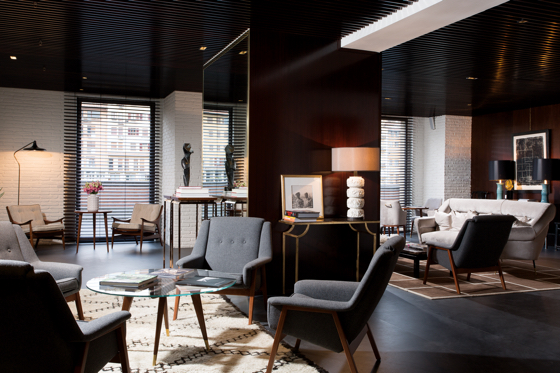His original dream was to be captain of the Starship Enterprise. But undaunted, Valeriano Antonioli, CEO of The Lungarno Collection, still aims to boldly go where no man has gone before – at least in the hotel industry.
In 2012, having been with the Florence-based, Ferragamo-owned Lungarno Collection for two years, he realized the group was missing some opportunities and set out to “create a brand different from everything we knew at that time.” So Portrait Hotels came into being.

Evolving in 2013 from the Portrait Suites in Rome and opening in Florence in 2014, Antonioli calls the brand bespoke tourism and describes it as “transforming uniform luxury into spontaneous personalization.”
The idea was that the guest should have the sense of staying in a private mansion with 5-star hotel services, reflecting the city in which it is located. Suites are designed to meet the guests’ personal needs and desires, from which they can embark on experiences crafted to their lifestyle. Hence the Portrait name. It’s “a place where the portrait of the city meets the portrait of the guest,” as Antonioli puts it.
That guest is an influential person who can afford the premium price tag (from around US$700 to US$3,300 per night for two people) and has limited time. They want experiences no one else has had, and they have tried and seen everything. They want to experience a city in the most efficient way, and range in age from 25 to 50. Many travel with families.
The only way to meet that level of expectation is to have exceptional staff, freed from the usual hierarchical constraints of the traditional hotel structure.
Antonioli created the Portrait University, which recruits and trains young people as “lifestyle attendants” with “the right attitude, empathy and savoir faire.” Once trained, he empowers them to “do and say whatever is right in front of every customer.” Their job is to create a relationship with the guest that sometimes starts a few weeks before they arrive so that their vacation can be styled exactly as they wish.

Hotels have two attendant teams working front of house: one international and multilingual to serve guests, the majority of whom come from the United States and Canada, but also the U.K., Italy, Russia, Middle East and Asia. The second team is local to Rome or Florence, and they know their city inside out. Both are sales aware, knowledgeable and independent.
“Putting together our understanding of the culture of the guests with deep knowledge of the city enables us to really style the vacation. It’s the human touch,” Antonioli says.
He is proud of the very personal relationships that are created and tells the story of a guest at Portrait Firenze who asked about a jogging path because he was training for the New York City Marathon. In the event, two employees trained with him while he was in Florence and ended up running the marathon alongside him. Others have organized spontaneous weddings and been invited to be witnesses and best man, so close had the relationship become.
With two Portrait hotels delivering financial success, Antonioli is working hard to find the next property, which will be in Europe, and is looking in the cities most enjoyed by current guests in key feeder markets. He hopes to be making an announcement by the end of the year. The right kind of real estate opportunity is not easy to find. Location is everything and the property has to have “a unique point of view of the city,” he says. “Guests have to be able to walk out from the hotel in heels.”

He’s still on the job after eight years because the Ferragamo family is so supportive. “They let me create Portrait where the renovations cost many millions and they had the trust to let me do it,” he says.
Antonioli anticipates they will be equally supportive as he seeks to evolve the collection. He’d be happy if over time Portrait had two or three more locations and was recognized worldwide. “That would be the tipping point,” he says. “Many doors would then open.” The group would then decide if they want to move more properties into the brand.
Antonioli is ambitious for the Lungarno dining collection, too, which currently has three restaurants and two bars, located within the group’s seven properties but with separate entrances.
In all aspects of the business, Antonioli has a focus on future trends. “Technology is very important, of course, but it must serve to make life better and more comfortable,” he says. “We’re more about the human touch, which I think is the most important trend. Technology needs to be about simplicity, not complicating the guest’s life – you don’t want it to be difficult to turn off the lights or close the curtains.”
Looking at the industry, Antonioli observes the big chains growing ever bigger and believes this will lead to service differentiation becoming flatter. “Even as a GM in that type of organization, you could become more like a number and lose your individual touch,” he adds. “It could be that discrete brands with just a few properties become the preferred style for the experienced, discerning traveler.”
Antonioli expects future trends to be generation driven. “There seems to be a new generation every day,” he says, “but I don’t think it is age that defines the generation, more the attitude of the guest.” He believes we all have to change our way of communicating and sees the likes of Instagram becoming ever more powerful. “Changes happen overnight and we all have to make sure we keep up.”
Lungarno Collection is looking into travel trends over the next five years to determine what they need to change in the design of their hotels and the service. “It’s all about the attitude of the guest,” Antoniloi says. “My generation worked at a desk, so every hotel room needed one but today’s traveler doesn’t need it – they work on the floor, the bed, the couch…”
Antonioli sees the value of the human touch as critical. “It is a challenge to find and keep people of the right caliber,” he says. “I have never stopped learning and things can change overnight. It is important to be both human and aware. My advice to younger people coming up in the world is the same as I tell our lifestyle attendants. “Do what you love. If you can follow the passion of your conscious and unconscious head, it is probably the best present you can have. I try to live that way every day.
“Be really professional in the area you want to be in, learn where you want to go. Make a plan and pursue that plan.”
When he fell back on his own Plan B, to be an hotelier, “I decided to be the GM of the best hotel in a city and made a plan of how I could get there,” Antonioli recalls. Back in 2000, he became the youngest Starwood general manager. “If you have passion and do a lot of hard work,” he says, “the future is kind in unexpected ways.”
